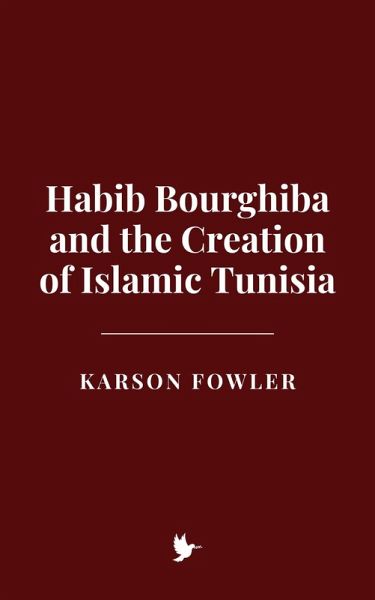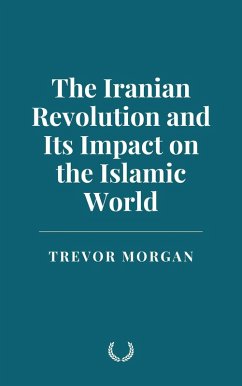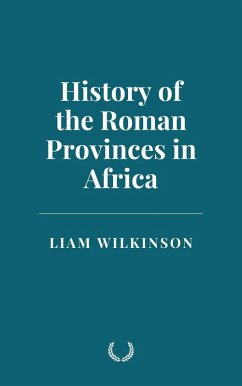
Habib Bourghiba and the Creation of Islamic Tunisia (eBook, ePUB)

PAYBACK Punkte
0 °P sammeln!
This book provides a comprehensive analysis of Habib Bourguiba's leadership in Tunisia, focusing on his role in shaping the country's modern identity, governance, and relationship between secularism and Islam. From his early involvement in Tunisia's nationalist movement to his presidency and the reforms he implemented, Bourguiba emerged as a transformative figure whose policies of secularism, economic modernization, and social reform laid the foundations of the modern Tunisian state. The book critically examines the tension between his vision of a secular, progressive Tunisia and the rise of I...
This book provides a comprehensive analysis of Habib Bourguiba's leadership in Tunisia, focusing on his role in shaping the country's modern identity, governance, and relationship between secularism and Islam. From his early involvement in Tunisia's nationalist movement to his presidency and the reforms he implemented, Bourguiba emerged as a transformative figure whose policies of secularism, economic modernization, and social reform laid the foundations of the modern Tunisian state. The book critically examines the tension between his vision of a secular, progressive Tunisia and the rise of Islamist movements, highlighting the ideological battles between secularists and Islamists that have shaped Tunisia's political culture.
Through an in-depth exploration of Bourguiba's achievements, such as the establishment of a secular legal framework, the promotion of women's rights, and the development of Tunisia's education and economic systems, the book showcases the complexities of nation-building in a post-colonial context. It also addresses the growing opposition to his policies, particularly from Islamist groups, which culminated in political instability and the eventual rise of Ennahda and other Islamist factions.
The narrative moves through Tunisia's democratic transition after the 2011 revolution, where the ideals of secularism and Islamism re-emerged as central points of contention. The book examines the challenges of reconciling Tunisia's Islamic heritage with democratic governance, particularly in light of the revolution's outcomes, the adoption of the 2014 constitution, and the ongoing political struggles between secular and Islamist forces.
Ultimately, the book reflects on Tunisia's unique position in the Arab world as a relatively successful example of democratic transition, while acknowledging the continued tension between the secular and religious visions of the state. Bourguiba's legacy, both his achievements and the contentious aspects of his rule, serves as a backdrop for understanding the complex dynamics of Tunisia's ongoing evolution. The book offers valuable insights into the challenges and prospects for Tunisia's future as it seeks to balance its Islamic roots with the demands of democracy and modernity.
Through an in-depth exploration of Bourguiba's achievements, such as the establishment of a secular legal framework, the promotion of women's rights, and the development of Tunisia's education and economic systems, the book showcases the complexities of nation-building in a post-colonial context. It also addresses the growing opposition to his policies, particularly from Islamist groups, which culminated in political instability and the eventual rise of Ennahda and other Islamist factions.
The narrative moves through Tunisia's democratic transition after the 2011 revolution, where the ideals of secularism and Islamism re-emerged as central points of contention. The book examines the challenges of reconciling Tunisia's Islamic heritage with democratic governance, particularly in light of the revolution's outcomes, the adoption of the 2014 constitution, and the ongoing political struggles between secular and Islamist forces.
Ultimately, the book reflects on Tunisia's unique position in the Arab world as a relatively successful example of democratic transition, while acknowledging the continued tension between the secular and religious visions of the state. Bourguiba's legacy, both his achievements and the contentious aspects of his rule, serves as a backdrop for understanding the complex dynamics of Tunisia's ongoing evolution. The book offers valuable insights into the challenges and prospects for Tunisia's future as it seeks to balance its Islamic roots with the demands of democracy and modernity.
Dieser Download kann aus rechtlichen Gründen nur mit Rechnungsadresse in A, B, CY, CZ, D, DK, EW, E, FIN, F, GR, H, IRL, I, LT, L, LR, M, NL, PL, P, R, S, SLO, SK ausgeliefert werden.













